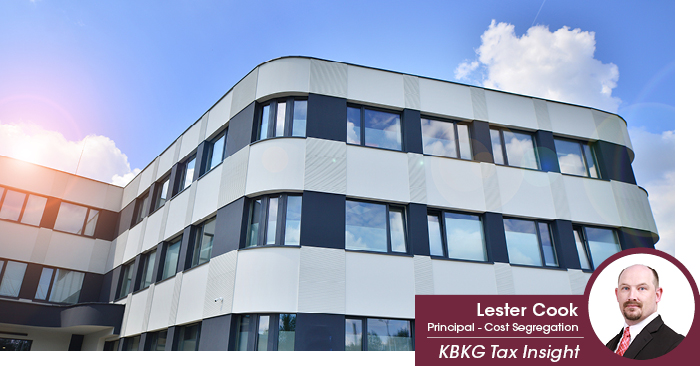Follow KBKG on Social Media
By Lester Cook | Principal, Cost Segregation
The One Big Beautiful Bill Act (OBBBA), signed into law on July 4, 2025, permanently restores and enhances key provisions of the Tax Cuts and Jobs Act of 2017. From 100% bonus depreciation and qualified production property expensing to Opportunity Zones and expanded housing credits, the OBBBA unlocks a favorable federal tax environment for real estate.
These new provisions come with important limitations and interdependencies, making thoughtful planning and expert guidance essential to fully capture their value. In many cases, additional IRS guidance and implementing regulations will be necessary to clarify the full scope and application of these incentives.
100% Bonus Depreciation: Permanently Restored
The reinstatement of 100% bonus depreciation, effective for property placed in service on or after January 20, 2025, is a powerful tool for real estate investors.
Eligible Property Includes:
- Nonresidential interior improvements (Qualified Improvement Property)
- Short-life assets identified through cost segregation
- Specified plants and orchards
Key Impact:
Bonus depreciation allows for immediate expensing, improving ROI, reducing tax liability, and freeing capital. Pairing this with cost segregation unlocks significant upfront deductions.
Expensing of Factory & Plant Property: New Industrial Incentive
A newly created provision allows 100% expensing for certain owner-occupied production facilities.
Requirements:
- New construction, placed in original use by taxpayer
- Integral to manufacturing, refining, or agricultural use
- Construction must begin between January 20, 2025, and December 31, 2028
Note: Office/admin, sales, or R&D components are excluded. A cost segregation analysis is crucial for distinguishing between qualified and non-qualified portions. A more in-depth exploration on this coming soon.
Opportunity Zones: A Long-Term Investment Framework
OBBBA permanently extends and modernizes the Opportunity Zone (OZ) program.
Highlights Include:
- Rolling 10-year designation periods (starting in 2027)
- Updated eligibility: tracts must be ≤70% of state median income or ≥20% poverty rate
- Annual basis step-ups, with triple boosts for rural OZs
- Reduced improvement thresholds (50% for rural)
- Extended 5-year rolling gain deferral window
Section 179 Expensing: Increased, but still Limited
Section 179 is enhanced by OBBBA, raising the expensing limit to $2.5 million and the phase-out to $5 million.
Applies to:
- HVAC
- Roofs
- Security/fire systems
- Doors
- Insulation and
- Windows
Critical Limitation:
Section 179 still does not apply to traditional rental properties unless they are used in an active trade or business (e.g., hotels, healthcare facilities). For passive rental real estate, bonus depreciation remains the key strategy.
Section 163(j): Interest Limitation and Bonus Depreciation Alignment
The shift back to an EBITDA-based limit for business interest deductions under Section 163(j) is a major win for real estate.
Why this matters:
- Under EBIT rules (2022–2024), depreciation and amortization were excluded
- EBITDA allows these to be added back, significantly increasing deductibility
- Taxpayers can often avoid electing out of 163(j), thereby retaining eligibility for bonus depreciation on QIP
Housing & Community Credits: LIHTC and NMTC
Both the Low-Income Housing Tax Credit (LIHTC) and New Markets Tax Credit (NMTC) are now permanent.
Key changes:
- LIHTC state allocation increased by 12%
- Bond test lowered from 50% to 25%
- NMTC now indefinite, supporting distressed community investments
Structuring Improvements: REITs, QBI, and More
OBBBA enhances flexibility across real estate entities::
- Section 199A (QBI deduction) made permanent; phase-ins raised to $75k/$150k
- REITs can now hold 25% of assets in taxable subsidiaries (up from 20%)
- Interest deductions are now more generous with the EBITDA standard
Work with KBKG
Let KBKG help you model, plan, and execute real estate tax strategies that take full advantage of the OBBBA.
Contact us for: Cost Segregation, Fixed Asset Reviews, LIHTC Basis Studies, Section 179 & Bonus Planning. Energy Incentive Structuring and more
About the Author
Lester Cook | Principal – Cost Segregation
Lester Cook has over 20 years of experience in the tax specialty service industry. He is a Principal of KBKG’s Fixed Asset Review Practice. He is a certified member of the American Society of Cost Segregation professionals, a group that he has been a part of since 2008. Throughout his career, Lester Cook has completed cost segregation analyses on thousands of properties ranging from office space leasehold improvements to multi-billion dollar industrial complexes and hotel and resort projects. He has worked with many Fortune 500 companies successfully representing his claims to both IRS and Financial Auditors…. Read More



